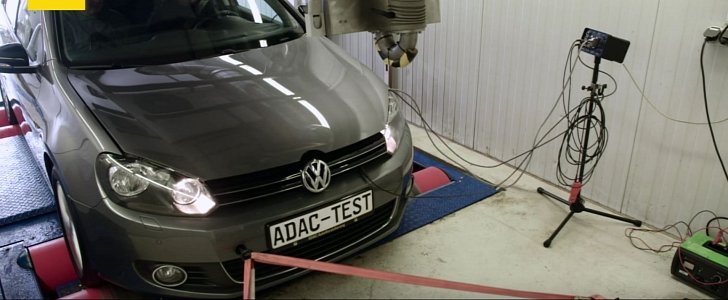While the recall of Euro 5 TDI engines is a little behind schedule, it seems Volkswagen is doing its job well. Germany's famous auto club ADAC took a 'repaired' Golf 6 with a 2.0-liter diesel engine, strapped it to the test rig and found there aren't any downsides.
That's awesome news for the millions of people in Europe who have that precise engine in their Golf, Octavia, Passat, Tiguan... whatever.
In fact, ADAC says there are benefits to the recall. The 2.0 TDI was supposed to make 140 PS, but it actually produced 147 PS (108 kW) before the recall, say the dyno numbers. After the modifications were carried out, the total output goes up slightly to 148 PS (109 kW). There were no torque gains, but the curve is smoother, which is also good news.
For the record, the recall for the 2.0 TDI includes software updates and a piece of plastic pipe that Volkswagen says makes the induction air flow smoother, thus leading to a better fuel mixture and combustion.
So far, the German company hasn't carried out the recall for its 1.2 TDI and 1.6 TDI engines, both of which have the Defeat Device. However, ADAC says it will carry out its test once again when they suitable engines are available.
The trick of the TDI recall is to improve combustion with the means available, keeping the turbocharger and built-in fuel injectors. NOx emission levels must go down, while fuel consumption needs to remain the same.
We don't know whether to trust ADAC's report or not. After all, Volkswagen has agreed to buy back its half-million cars equipped with the 2.0 TDI in the United States, which suggests they cannot be fixed.
In the end, this story once again comes down to a difference in regulations between the two countries, as the US has much harsher rules when it comes to the gasses that come out at engine start-up.
ADAC carried out a specific autobahn emissions test, which we've never heard of before, and found emissions went down by 30%. However, in the US, TDI engines were many times over the legal limit, meaning they should have gone down by something like 95% or a ridiculous number like that.
In fact, ADAC says there are benefits to the recall. The 2.0 TDI was supposed to make 140 PS, but it actually produced 147 PS (108 kW) before the recall, say the dyno numbers. After the modifications were carried out, the total output goes up slightly to 148 PS (109 kW). There were no torque gains, but the curve is smoother, which is also good news.
For the record, the recall for the 2.0 TDI includes software updates and a piece of plastic pipe that Volkswagen says makes the induction air flow smoother, thus leading to a better fuel mixture and combustion.
So far, the German company hasn't carried out the recall for its 1.2 TDI and 1.6 TDI engines, both of which have the Defeat Device. However, ADAC says it will carry out its test once again when they suitable engines are available.
The trick of the TDI recall is to improve combustion with the means available, keeping the turbocharger and built-in fuel injectors. NOx emission levels must go down, while fuel consumption needs to remain the same.
We don't know whether to trust ADAC's report or not. After all, Volkswagen has agreed to buy back its half-million cars equipped with the 2.0 TDI in the United States, which suggests they cannot be fixed.
In the end, this story once again comes down to a difference in regulations between the two countries, as the US has much harsher rules when it comes to the gasses that come out at engine start-up.
ADAC carried out a specific autobahn emissions test, which we've never heard of before, and found emissions went down by 30%. However, in the US, TDI engines were many times over the legal limit, meaning they should have gone down by something like 95% or a ridiculous number like that.






